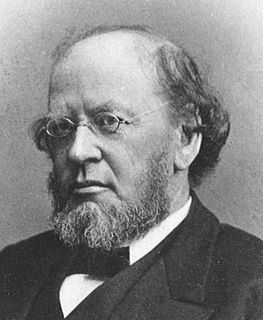A Quote by Bertrand Russell
The fundamental defect of Christian ethics consists in the fact that it labels certain classes of acts 'sins' and others 'virtue' on grounds that have nothing to do with their social consequences.
Related Quotes
The Gospel is temporary, but the law is eternal and is restored precisely through the Gospel. Freedom from the law consists, then, not in the fact that the Christian has nothing more to do with the law, but lies in the fact that the law demands nothing more from the Christian as a condition of salvation. The law can no longer judge and condemn him. Instead he delights in the law of God according to the inner man and yearns for it day and night.
Sin is not only manifested in certain acts that are forbidden by divine command. Sin also appears in attitudes and dispositions and feelings. Lust and hate are sins as well as adultery and murder. And, in the traditional Christian view, despair and chronic boredom - unaccompanied by any vicious act - are serious sins. They are expressions of man's separation from God, as the ultimate good, meaning, and end of human existence.
The Lord never came to deliver men from the consequences of their sins while yet those sins remained...Yet men, loving their sins and feeling nothing of their dread hatefulness, have, consistent with their low condition, constantly taken this word concerning the Lord to mean that he came to save them from the punishment of their sins.
Christian Science has always appealed to the middle-classes and the upper middle classes. In part, this is because it requires a certain amount of education to study 'Science and Health' to the degree that Christian scientists do. It's not an easy book to read! It's 700 pages, and it's written in a nineteenth-century manner and diction.
For everyone nowadays knows, absolutely is CERTAIN, that nothing bad will ever happen to ME. Others die, I go on. There are no consequences and no responsibilities. Except that there ARE. But let's not talk about them, eh? By the time the consequences catch up to you, it's too late, isn't it, Montag?
I am as sure as I am of the fact of Christ's reign, that a comprehensive and centralised system of national education, separated from religion, as is now commonly proposed, will prove the most appalling enginery for the propagation of anti-Christian and atheistic unbelief and of anti-social nihilistic ethics, social and political, which this sin-rent world has ever seen.
The explanation of types of structure in classes - as resulting from the will of the Deity, to create animals on certain plans - is no explanation. It has not the character of a physical law and is therefore utterly useless. It foretells nothing because we know nothing of the will of the Deity, how it acts and whether constant or inconstant like that of man.
No one should judge that he has greater perfection because he performs great penances and gives himself in excess to the staying of the body than he who does less, inasmuch as neither virtue nor merit consists therein; for otherwise he would be an evil case, who for some legitimate reason was unable to do actual penance. Merit consists in the virtue of love alone, flavored with the light of true discretion without which the soul is worth nothing.



































